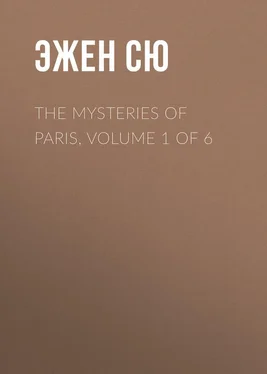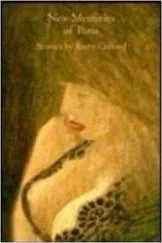Эжен Сю - The Mysteries of Paris, Volume 1 of 6
Здесь есть возможность читать онлайн «Эжен Сю - The Mysteries of Paris, Volume 1 of 6» — ознакомительный отрывок электронной книги совершенно бесплатно, а после прочтения отрывка купить полную версию. В некоторых случаях можно слушать аудио, скачать через торрент в формате fb2 и присутствует краткое содержание. Жанр: literature_19, foreign_antique, foreign_prose, на английском языке. Описание произведения, (предисловие) а так же отзывы посетителей доступны на портале библиотеки ЛибКат.
- Название:The Mysteries of Paris, Volume 1 of 6
- Автор:
- Жанр:
- Год:неизвестен
- ISBN:нет данных
- Рейтинг книги:4 / 5. Голосов: 1
-
Избранное:Добавить в избранное
- Отзывы:
-
Ваша оценка:
- 80
- 1
- 2
- 3
- 4
- 5
The Mysteries of Paris, Volume 1 of 6: краткое содержание, описание и аннотация
Предлагаем к чтению аннотацию, описание, краткое содержание или предисловие (зависит от того, что написал сам автор книги «The Mysteries of Paris, Volume 1 of 6»). Если вы не нашли необходимую информацию о книге — напишите в комментариях, мы постараемся отыскать её.
The Mysteries of Paris, Volume 1 of 6 — читать онлайн ознакомительный отрывок
Ниже представлен текст книги, разбитый по страницам. Система сохранения места последней прочитанной страницы, позволяет с удобством читать онлайн бесплатно книгу «The Mysteries of Paris, Volume 1 of 6», без необходимости каждый раз заново искать на чём Вы остановились. Поставьте закладку, и сможете в любой момент перейти на страницу, на которой закончили чтение.
Интервал:
Закладка:
"What! those rags? Come, now, you shall keep the change from yesterday, and I'll give you another louis, and no more. If I give you all I have, I shall cheat the poor, who ought to get some alms out of me."
"Well, then, my fine fellow, I'll keep my things, and Goualeuse sha'n't go out. I have a right to sell my things for what I choose."
"May Lucifer one day fry you as you deserve! Here's your money; go and look for Goualeuse."
The ogress pocketed the gold, thinking that the workman had committed a robbery, or received a legacy, and then said, with a nasty leer, "Well, indeed! Why not go up-stairs, and find Goualeuse yourself; she'll be very glad to see you, for, on my life, she was much smitten with you yesterday?"
"Do you go and fetch her, and tell her I will take her into the country; that's all you need say; not a word about my having paid you her debt."
"Why not?"
"What's that to you?"
"Oh, nothing; it's no matter to me; I would rather that she still believed herself in my clutch – "
"Will you hold your tongue, and do as I bid you?"
"Oh, what a cross creetur you are! I pity anybody who is under you. Well, I'm going, I'm going;" and the ogress went up-stairs.
After a few minutes she came down again.
"Goualeuse would not believe me, and really turned quite crimson when she knew you were here; and when I told her that I would give her leave to pass the day in the country, I thought she would have gone crazy, – for the first time in her life she was inclined to throw her arms about my neck."
"That was her delight at leaving you."
Fleur-de-Marie entered at this moment, dressed as she was the over-night, with her gown of brown stuff, her little orange shawl tied behind her, and her handkerchief of red checks over her head, leaving only two thick bands of light hair visible. She blushed when she saw Rodolph, and looked down with a confused air.
"Would you like to pass the day in the country with me, my lass?" asked Rodolph.
"Very much, indeed, M. Rodolph," said Goualeuse, "since madame gives me leave."
"Yes, yes, you may go, my little duck, because you're such a good gal. Come and kiss me afore you go."
And the old beldam offered her bloated lips to Fleur-de-Marie. The poor girl, overcoming her disgust, bent her forehead to the ogress, but Rodolph, giving a sudden push with his elbow, shoved the hag back on her seat, took Fleur-de-Marie's arm, and left the tapis-franc , amidst the loud maledictions of Mother Ponisse.
"Mind, M. Rodolph," said Goualeuse; "the ogress will, perhaps, throw something at you, – she is very spiteful."
"Oh, don't heed her, my girl. But what's the matter with you? You seem embarrassed, sad. Are you sorry for having come out with me?"
"Oh, dear, no; but – but – you give me your arm!"
"Well, and what of that?"
"You are a workman, and some one may tell your master that they met you with me, and harm may come of it; masters do not like their workmen to be unsteady." And Goualeuse gently removed her arm from that of Rodolph, adding, "Go on by yourself; I will follow you to the barrier; when we are once in the fields I can walk with you."
"Do not be uneasy," said Rodolph, touched by the poor girl's consideration, and taking her arm again; "my master does not live in this quarter, and we shall find a coach on the Quai aux Fleurs."
"As you please, M. Rodolph; I only said so that you might not get into trouble."
"I am sure of that, and thank you very much. But tell me, is it all the same to you what part of the country we go into?"
"Yes, quite so, M. Rodolph, so that it be the country. It is so fine and it is so nice to breathe the open air! Do you know that I have not been farther than the flower-market for these six weeks? And now, if the ogress allows me to leave the Cité, she must have great confidence in me."
"And when you came here, was it to buy flowers?"
"Oh, no, I had no money; I only came to look at them, and breathe their beautiful smell. During the half-hour which the ogress allowed me to pass on the quay on market-days, I was so happy that I forgot everything else."
"And on returning to the ogress, and those filthy streets?"
"Oh, why, then I returned more sad than when I set out; but I wiped my eyes, that I might not be beaten for crying. Yet, at the market, what made me envious – oh, so envious! – was to see neat, clean little workwomen, who were going away so gaily with a beautiful pot of flowers in their hands."
"I am sure that if you had had but a few flowers in your own window, they would have kept you company."
"What you say is quite true, M. Rodolph. Only imagine, one day, on her birthday, the ogress, knowing my taste, gave me a little rose-tree. If you only knew how happy it made me, – I was never tired of looking at it, – my own rose-tree! I counted its leaves, its flowers; but the air of the Cité is bad, and it began to wither in two days. Then – but you'll laugh at me, M. Rodolph."
"No, no; go on."
"Well, then, I asked the ogress to let me go out, and take my rose-tree for a walk, as I would have taken a child out. Well, then, I carried it to the quay, thinking that to be with other flowers in the fresh and balmy air would do it good. I bathed its poor fading leaves in the clear waters of the fountain, and then to dry it I placed it for a full quarter of an hour in the sun. Dear little rose-tree! it never saw the sun in the Cité any more than I did, for in our street it never descends lower than the roof. At last I went back again, and I assure you, M. Rodolph, that, thanks to these walks, my rose-tree lived at least ten days longer than it would have done, had I not taken such pains with it."
"No doubt of it. But when it died, what a loss it must have been to you!"
"I cried heartily, for it grieved me very, very much; and you see, M. Rodolph, – for you know one loves flowers, although one hasn't any of one's own, – you see, I felt grateful to it, that dear rose-tree, for blooming so kindly for me, although I was so – "
Goualeuse bent her head, and blushed deeply.
"Unhappy child! With this feeling of your own position, you must often – "
"Have desired to end it, you mean, sir?" said Goualeuse, interrupting her companion. "Yes, yes, more than once. A month ago I looked over the parapet at the Seine; but then, when I looked at the flowers, and the sun, then I said, 'The river will be always there; I am but sixteen and a half, – who knows?'"
"When you said 'who knows,' you had hope?"
"Yes."
"And what did you hope?"
"To find some charitable soul who would get me work, so that I might be enabled to leave the ogress; and this hope comforted me. Then I said to myself, I am very wretched, but I have never injured anybody, and if I had any one to advise me I should not be as I am. This lightened my sorrow a little, though it had greatly increased at the loss of my rose-tree," added Goualeuse, with a sigh.
"Always so very sad."
"Yes; but look, here it is."
And Goualeuse took from her pocket a little bundle of wood trimmed very carefully, and tied with a rose-coloured bow.
"What, have you kept it?"
"I have, indeed; it is all I possess in the world."
"What, have you nothing else?"
"Nothing."
"This coral necklace?"
"Belongs to the ogress."
"And you have not a piece of riband, a cap, or handkerchief?"
"No, nothing, – nothing but the dead branches of my poor rose-tree; and that is why I love it so."
When Rodolph and Goualeuse had reached the Quai aux Fleurs, a coach was waiting there, into which Rodolph handed Goualeuse. He got in himself, saying to the driver:
"To St. Denis; I will tell you presently which road to take."
The coach went on. The sun was bright, and the sky cloudless, whilst the air, fresh and crisp, circulated freely through the open windows.
Читать дальшеИнтервал:
Закладка:
Похожие книги на «The Mysteries of Paris, Volume 1 of 6»
Представляем Вашему вниманию похожие книги на «The Mysteries of Paris, Volume 1 of 6» списком для выбора. Мы отобрали схожую по названию и смыслу литературу в надежде предоставить читателям больше вариантов отыскать новые, интересные, ещё непрочитанные произведения.
Обсуждение, отзывы о книге «The Mysteries of Paris, Volume 1 of 6» и просто собственные мнения читателей. Оставьте ваши комментарии, напишите, что Вы думаете о произведении, его смысле или главных героях. Укажите что конкретно понравилось, а что нет, и почему Вы так считаете.












